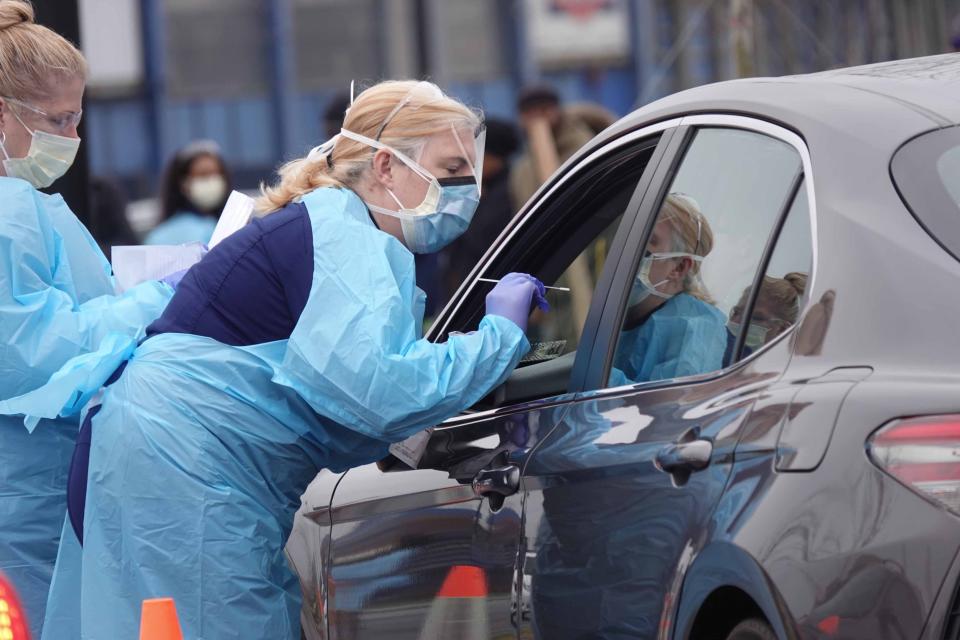Medicaid gains middle-class interest amid job losses, worries about coronavirus spread
Expanded and increased funding of Medicaid is needed more than ever so the people most susceptible to COVID-19 can afford health care, proponents of the program said.
The 14 states that didn't extend Medicaid coverage under the Affordable Care Act are under new pressure to do so to help stop the spread of the coronavirus. A law requiring free coronavirus testing for everyone boosted the share of Medicaid costs paid by the federal government.
This week, the National Governors Association asked for the federal match to be nearly doubled, but only for states that expanded Medicaid.

"If we can’t prioritize Medicaid expansion given the health implications of a pandemic of historic proportions and an economic catastrophe of historic proportions, we’re incapable of resolving this intractable problem," said health economist David Becker of the University of Alabama-Birmingham.
The record numbers of newly unemployed people and the virus's disproportionate effect on low-income people of color has increased the focus and the demands on Medicaid. The federal government contributes at least half and often much more of a state's share of the cost of the program, which provides typically free or very low-cost health coverage to eligible people who are poor, elderly, pregnant or disabled.
Medicaid is often a state's largest expense, and coronavirus response is likely to force massive state budget cuts by governors who, unlike federal officials, are required by law to balance their budgets.
Rep. Lloyd Doggett, D-Texas, and 150 Democratic members of Congress urged House leaders this week to resist Republican efforts to remove consumer protections in Medicaid from the next congressional COVID-19 funding package in an attempt to save money.
Provisions included in the Families First Coronavirus Response Act protect Medicaid patients from having coverage taken away during the pandemic and prohibit states from changing who is qualified for the program. Senate Majority Leader Mitch McConnell, R-Ky., tried to block these "maintenance of effort" protections in last month's $2 trillion economic relief package, and Doggett expects the issue to be brought up again.
The conservative Foundation for Government Accountability urged lawmakers to oppose the protections. The group said they would "exacerbate state budget crises stemming from the pandemic, strip states of needed tools to manage Medicaid, rob resources from the truly needy, and bind states’ hands for decades to come."
Where are the warnings? How do health care staffers learn if co-workers have coronavirus? Word of mouth.
Health care workforce hit hard: Thousands of health care workers sickened by COVID-19 and 27 dead, CDC report says
Bari Talente, executive vice president of advocacy for the National Multiple Sclerosis Society, said although groups such as hers "understand the pressure that states are going to be under, we have to protect the vulnerable populations."
Coronavirus makes the definition of who's vulnerable much more sweeping. Even people with private insurance benefit when others can afford treatment and reduce the virus's spread.
"With such a highly contagious disease, assuring everyone can access health care protects each one of us," Doggett said in a statement. "Without Medicaid, many of our most vulnerable – children, pregnant women, individuals with disabilities, and more – will not seek care due to cost."
Medicaid recipients have more of the chronic health conditions that increase the likelihood they’ll get COVID-19 and face more life-threatening illness when they do.
Social distancing is often not an option for them. Many are retail and fast-food restaurant employees working outside the home and have low enough wages to be eligible for the program.
That's more likely the case in states that expanded Medicaid to everyone who earns less than 138% of the federal poverty limit, or $35,535 for a family of four. In states that did so after the Affordable Care Act passed in 2010, the federal government paid the full cost of the additional coverage starting in 2014. That percentage gradually dropped and, starting this year and beyond, it is 90% of the cost of the additional recipients covered by Washington.
"States that haven’t expanded Medicaid are leaving federal money on the table and missing out on a major opportunity to provide more health care to their residents," said Katherine Hempstead, senior policy adviser at the Robert Wood Johnson Foundation. "In the economic dislocation that accompanies coronavirus, Medicaid will be more important than ever as millions lose their jobs and their employer health insurance.”
Far more people are likely to be beneficiaries of broader Medicaid coverage. Robin Rudowitz, co-director of the Kaiser Family Foundation's Program on Medicaid and the Uninsured, said many people who sign up for health insurance on the federal and state ACA exchanges may be surprised to see they qualify for the program.
"This is going to be the first major economic downturn after the ACA," Rudowitz said. Unlike during the Great Recession, "there's a broader safety net with other coverage options, but in the non-expansion states, there will be fewer options."
The University of Alabama's Becker said the state-federal funding of Medicaid makes it the perfect vehicle to satisfy both parties when government is needed more than ever.
"I thought of this crisis being the source of the opportunity where we could resolve the intractable standoff between the holdout set in more conservative states and the national Democratic Party," Becker said. If it isn't, it will be a "true crisis of leadership."
Follow @JayneODonnell on Facebook and Twitter or email jodonnell@usatoday.com
This article originally appeared on USA TODAY: COVID-19 boosts demand, pressure on Medicaid amid job losses

